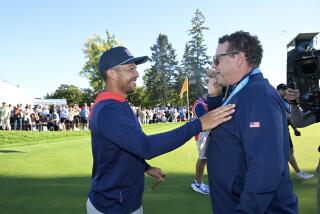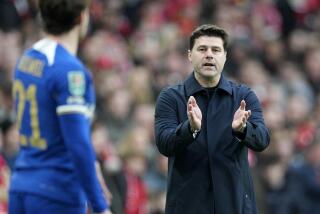Becker Sends U.S. Team to the Minors : His Five-Set Win Over Mayotte Gives West Germany 3-2 Victory
- Share via
HARTFORD, Conn. — Really, this whole story--the unraveling of the U.S. Davis Cup team--actually started at Gothenburg, Sweden, back in 1984.
That was the beginning of the end. In three short years, the Americans have gone from Davis Cup finalists to zonal qualifying competition. It would be like the Boston Celtics getting banished to the Continental Basketball Assn. in 1990.
When the United States fell behind, 2-0, after Friday’s matches in the relegation round against West Germany, it was all but official--the Americans were heading to the zones and wouldn’t be heard from in Davis Cup competition until 1989.
As expected, Ken Flach and Robert Seguso won their doubles point on Saturday, and John McEnroe defeated Eric Jelen, 7-5, 6-2, 6-1, on Sunday to even the best-of-five series, 2-2. But that only staved off the inevitable as Boris Becker beat Tim Mayotte, 6-2, 6-3, 5-7, 4-6, 6-2, at the Civic Center in front of 12,887.
Which means the West Germans return to the World Group to compete with the likes of France, Sweden and Australia, while McEnroe starts brushing up with a Spanish phrase book.
“It’s not my idea of fun to go to Bolivia, but you’ve got to do what you’ve go to do,” McEnroe said.
What gives the defeat extra sting was how Mayotte came ever so close to redeeming himself on Sunday before losing. The match was dead even at two sets all, two games each in the fifth before Becker managed to reach back for something extra.
That intangible, a special something, is what separates players such as Becker and Mayotte. Jimmy Connors had it. McEnroe is trying to get it back. Players like Mayotte try everything they can to get it, but are relegated to always talking about the might-have-beens. One often says things such as that would have been Tim Mayotte’s best match .
Everyone was saying it again.
“It was the most difficult match I’ve had under all the circumstances,” Becker said. “With the 14,000 Americans cheering and the crowd making cheers like after every missed serve.”
Said Mayotte: “Every match (is tough), every time we get together. The first time I beat him, at Delray Beach, was easier. Before Wimbledon, at Queen’s, he beat me in three tough sets. They’ve all been tough.”
Mayotte was asked whether this would have been his best victory.
“It’s not a win, so I don’t really think I can comment on that.”
Speaking of what-ifs, the match might have had a different flavor, if not ending, had Mayotte converted two break points in the fifth game of the second set. When Becker pushed a backhand volley into the net at deuce, it gave Mayotte a break opportunity for his first lead of the match since the opening game.
Becker, though, came back with a backhand volley down the line for a winner. Two points later, he saved a second break point by putting away an easy forehand volley.
“I was thinking he has to crack up,” Becker said of the fifth game. “The only thing was that he was going to crack up if he had the chances to beat me. From then on, I knew if I ever pushed through it, I could beat him.”
His push knocked Mayotte out of the match in the sixth game. Mayotte, suffering from a letdown after failing to convert the break points, hit a forehand volley long to lose his service, giving Becker a 4-2 lead. Then, Becker held at love and broke Mayotte again to finish the match.
Now, the United States has a 10-13 record in Davis Cup ties that have gone to the fifth and deciding match. Another, more telling, statistic is that the Americans have never been knocked down to zonal competition.
If the U.S. team had succeeded on Sunday, it would have been only the second American comeback from 0-2 in 206 matches. The Davis Cup team did it 53 years ago against the Australians in the semifinals at London. Frank Shields, the grandfather of Brooke Shields, won the deciding match.
Back then, though, they didn’t have zonal qualifying competition. The concept was introduced in 1974 because so many countries wanted to enter teams to compete for the Davis Cup.
“I don’t think the players are going to treat it as an embarrassment,” U.S. captain Tom Gorman said about playing in the zones. “I didn’t see anything embarrassing out there this weekend.”
Mayotte, too, said he didn’t see anything embarrassing about the drop in status. But McEnroe did express embarrassment at “having to go to a bunch of countries nobody has ever heard of.”
On Sunday, McEnroe did everything he could to prevent that possibility. Although it took him a while to get into the match against Jelen, he immediately started to pump up the crowd, waving his hands to orchestrate the mood.
He broke Jelen at love in the 12th game of the first set to win it, 7-5. From then on, it was a routine match, at least as routine as McEnroe can get. After the final point, he grabbed a large American flag from a fan and walked around the court waving it back and forth like Carl Lewis at the Coliseum.
McEnroe’s enthusiasm rubbed off on Mayotte, who is usually rather subdued. Obviously, he realized that getting the crowd on his side was his only real chance against Becker. And, even after Becker played brilliant tennis to take a two-set lead over Mayotte, the crowd stayed in the match.
Finally, it started to get to Becker. He had run off 22 consecutive service points against Mayotte--starting with the last two points of the first set and continuing until the 1-0 in the third. But the crowd, and Becker’s inability to keep up such a high standard, helped Mayotte break service twice in the third.
By the time Mayotte sent the match into a fifth set, the fans cheered every time Becker missed a serve.
“The American team guys made the spectators crazy,” Becker said. “I don’t think the Americans should complain about South America. It’s not much better here.
“They really made the crowd wild when they stood up and waved the flag.”
Gorman and Mayotte disagreed with Becker, pointing out that body guards with machine guns weren’t exactly patrolling the aisles at the Civic Center.
“There’s been death threats on players’ lives in Paraguay,” Mayotte said. “I don’t know if there’s been a death threat on Boris’ life here.”
The United States won’t have to worry about another trip to Paraguay, but it could play in many other potential trouble spots in next year’s zonal play. No one is exactly sure, but Gorman believes the Americans will have to win three matches next year in order to reach the World Group in 1989.
Which will be five years after the visiting U.S. squad lost to Sweden in the Davis Cup final.
In a sense, Mayotte is viewed in this mess as the fall guy, the one who folded under pressure. He wasn’t supposed to beat Becker, but he was expected to win against Jelen.
The United States should have never had to win two matches on the final day, just as it never should have lost in Paraguay. If Jimmy Arias had converted one of his three match points against Hugo Chapacu, relegation would have remained an unknown word to American tennis fans.
Let’s take it one step further.
As a result of McEnroe’s behavior in Sweden, players had to sign a code of conduct pledge. He was banned from the Davis Cup team when he refused to sign it. Former USTA president Randy Gregson continued the war against McEnroe and refused to let Gorman pick him against Australia last year. Even when the new USTA administration changed its stance, McEnroe was still upset over the episode and didn’t play against Paraguay. So the United States was forced to play with two guys (Arias and Aaron Krickstein) who have rarely played well in big matches under pressure.
By the time McEnroe realized this meant trouble, the U.S. team was making Chapacu a national hero.
Finally, even though Mayotte looks like the villain in this story, he has plenty of company. Arias, Krickstein, Gregson, and several others. The first chapter of the continuing Davis Cup saga was written three years ago, long before Hartford and, perhaps, Bolivia.



